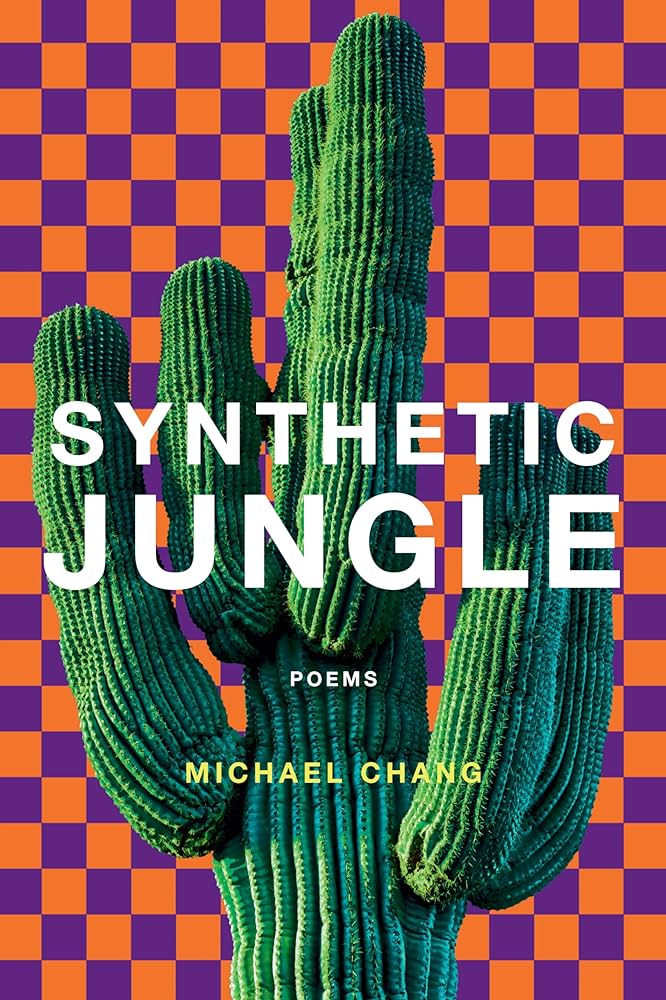
Landscapes of Encounter
Michael Chang’s Synthetic Jungle is a kaleidoscope of “erotic potential” (4), characterized by hyper-physical syntax, compression, and abandon. It is a radiant flirtation with the sensory and a bona fide ode to the poetic act, wherein grammar, body, and world intermingle. The collection moves through contemporary city streets, accumulating fragments of whimsy, proximity, and distance, while also spinning and thinking in place– intricately housing a cacophony of voices, ponderings, and poetic citations.
The collection’s warbling call, “Everything is poetry,” (33) cascades across the collection in a quilt of language– stitching together morsels of observation and confession. Chang ushers the reader through the fleetingness and multiplicity of encounter, pondering and tumbling within dailiness toward small moments of the infinite:
“chaos butter
yogurty hunk
a fine schmear
can you ever trust
hearts for eyes
shoulder killing me
you are forever” (12-13)
The proposition of poetry being everywhere, or existing in everything, imbues the world of Synthetic Jungle with wildness and freedom. Strangeness, too. Elucidating the notion of poetic omnipresence, “明太子 MENTAIKO” claims, embedded within a field of fragments, “Some poems are just lists of fungi” (35). Across the collection, Chang seems to pose poetry as burgeoning from a boundless source, or perhaps aiding in the digestion of what has been lost. Indeed, these poems, even within their locales of urban modernity, sprout toadstools of desire that grow between stones on the speaker’s path. They seem to be inhabited by the dancing “green ghosts,” Chang writes of, who “give it their all” and “get better together” (34)– enmeshed in tenderness and decay. Undergirding its fragmentation, the pursuit of desire remains the collection’s fortified root system.
The realm of desire is also where the natural and the synthetic intersect. I found myself submerged in ecstatic sensory modes with lines like, “Touching u was like blotting out the sun” (24), and in more quiet reflection, “Among the tendrils under my pillow/A copper feeling / A buried heart” (52). Desire, the reader comes to know, is a domain filled with both the seen and the unseen. Chang cultivates a landscape where encounter, with the world and with another, leaves indelible marks even in its ephemerality.
I learn so much from Synthetic Jungle about abundance of meaning. Particularly how intimacy and its aftermath may open new possibilities for the construction of a self. The collection masterfully holds both tones of amusement and irony with total heartfeltness. In this meaning-making, the reader is privy to intimate words and inner-most thoughts, all compressing and releasing towards something more protean, more free. In CAVALLI LOUNGE LIZARD, Chang writes,
“you are also hot
slick like mercury
small flame sweet swan
the quiz says i could be a wolf or a dolphin” (19)
This sensuous run allows itself to be indulgent in its description of desire, then breaks off into a new fragment of variable meaning. The refractive form, located across the landscape of Synthetic Jungle, has a scattering effect– opening prisms of possibility within personhood, encounter, and where it may lead. The form also allows for a reveling in confession, yearning, and emptiness, while never lingering in a single domain for too long. Rather it chips away at the stucco coated around any particular state of being, and flings itself into a state of shifting potential. And even at the end of desire, a place where language and meaning ofen falter, I recognize in these poems a playful and heartbreaking plurality that feels like clarity.
“sorry i was busy putting trash in my body
when i’m gone
will u be okay
or o.k.
or ok” (31)
Synthetic Jungle takes a self-reflexive look into the poetic act itself– interrogating the spark of influence, as well as language and its foibles. At times, Chang breaks the fourth wall between speaker and audience– “i can’t remember how to write a good poem” (31), or “The meaning lies in the sound/The meaning lies { }” (18), placing fullness and void in close conversation. Parsing through patches of daily, intimate detailing alongside inquiries into what poetry means and how it is made, feels much like “circling the rim of desire” (7). Every line asymptotically approaches an edge–on the verge of more love, more breakage, more poetry. Hung in this balance, the reader is left, by the end of the collection, all the more “odd and splendid” (15). The heart is cast in its frailty and in its fluorescent flush.
Haley Joy Harris is a writer from Los Angeles living in Western Massachusetts. She is currently an MFA candidate in Poetry at the University of Massachusetts-Amherst.
